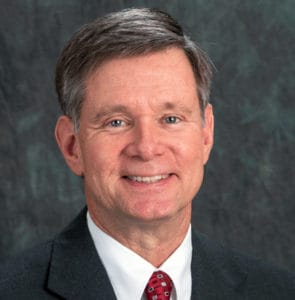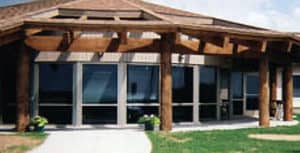Abundant Life and Biimaadiiziiwiin — A Multicultural Belief

By the Rev. Kenneth Daniel, president and CEO of United Church Homes. Reprinted with permission.
As an unrepentant liberal arts major, I am often drawn to various esoteric topics across a broad range of interests. This may be part of why a friend once affectionately described me as “obscure but well intentioned.” I can get a bit pedantic often exploring academic posts that Facebook sends me through what must be a very convoluted algorithm indeed! So, I must confess to being what many call “a word nerd.”
United Church Homes (UCH), based in Marion, Ohio, sponsors two residential communities on tribal nation lands in Minnesota and Nebraska. I recently heard a podcast about Native American indigenous spirituality. Several indigenous professors focused on diverse elements of spiritual and religious practices of Anishinabe, Ojibwe, Apache, and other tribal nations.
But what really captured my attention was a presentation by Dr. Maria Yellow Horse Brave Heart, Ph.D., an associate professor at the University of New Mexico, about the concept of Biimaadiiziiwiin (Bee-maa-da-ZEE-win). Coincidentally, Biimaadiiziiwiin is the name UCH chose for its apartment building on the White Earth Reservation in Minnesota. Suddenly this became very personal for me!
During her presentation, Dr. Brave Heart, who is a member of the Hunkpapa/Ogalala nation, noted that Biimaadiiziiwiin is roughly translated into English as “the good life.” But to her, “Biimaad,” (UCH’s affectionate abbreviation) is a much richer metaphor than what white Anglo-European-Christian perspectives may understand.

This name reflects the confluence of the Creator’s healing presence and powers directed toward an injured person, family, or tribe. That healing energy stems from the Creator’s original intention for creation in harmony, at peace and in balance among all creatures. The Anishinabe people create “braided stories,” narratives that knit together tales and songs that recall God’s healing powers, imminent presence in nature, and preference for those who are suffering. Biimaadiiziiwiin is a state of harmony, creation and humankind in balance for the well-being of all. This is part of the Creator’s holy intention for the people and the Earth.
Suddenly, it occurred to me that Biimaadiiziiwiin echoes what we call “Abundant Life.” This is part of John’s gospel and the Parable of the Good Shepherd. Jesus comes to bring abundant life to the people.
UCH has adopted that verse as its vision statement — “Where the Spirit creates Abundant Life in community.” While UCH’s concept goes back to the early First Century Christian community, the Anishinabe concept is likely much older. It is a different cultural perspective, to be sure, but aligns with our Christian understanding of God’s healing efforts to reconcile, rebuild and renew broken humanity, planet, and people. Our Christian sense of Biimaadiiziiwin is expanded when we see the work of Jesus Christ as the means of restoration of creation and all people everywhere.
This is not to Christianize the concept of Biimaadiiziiwiin in any way. Abundant Life is also captured in the Jewish concept of Shalom. This is the energy of God directed at sustaining the human community in balance with all creation. It is a place, a state of peace and harmony. People are called to live in a just, interconnected community at one with God, each other and the wider world.
The Anishinabe concept is a significant enhancement to a white Christian-centric understanding. We can do what the Anishinabe people do and “braid” our concept with that of other cultures and religions to create a deeper, more complete story of what our mission means to “transform aging, by building a culture of community, wholeness, and peace.” UCH’s mission echoes this meaning in its community’s name, bringing forth God’s restorative Spirit to heal people, families, communities and even the planet.
Knowing this Anishinabe concept — and the depth of meaning it contains — suddenly transformed the way I understand the importance of the indigenous people UCH serves and the cultural humility UCH needs to bring to its relationship with them. We have much to learn and receive in order to better perceive our relationship to the Creator and creation.
And the Creator’s spirit of the good life is for all creatures to live in harmony, peace, community and love, at one with the Earth and each other. That is the definition of the Good Life contained deep within the stories about Biimaadiiziiwiin and the gospel of John. UCH’s role is to live up to the demands of this spiritual reality and make its programs and people part of the healing energies directed at human brokenness and social injustices wherever we meet it. This is the vision and the mission at UCH as it braids lessons learned from the indigenous people it serves.
So sometimes being an obscure but well intentioned “word nerd” can be useful! Who knew?
Join Our Mailing LIst
"*" indicates required fields
Follow on Facebook
Denise Buck to Succeed Campbell as IFM CEO - CHHSM
www.chhsm.org
As IFM Community Medicine (IFM) Founder and CEO David Campbell M.D. plans to retire mid-year, his successor, Denise Buck M.D., has started working full-time with IFM in St. Louis. Before assuming this...